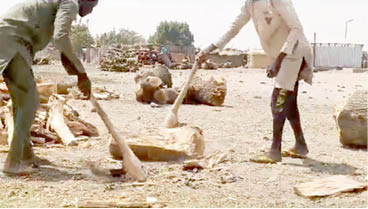The Boko Haram humanitarian crisis in the North-East, which puts millions of Internally Displaced Persons (IDPs) on the edge, is equally and gravely impacting on conservation of the environment.
The crisis is also accelerating factors precipitating climate change and its attendant consequences on livelihood.
Countries around the world are doing a lot to encourage free planting, which is one of the best solutions to climate change.
While it is common to see farmers clearing forests to produce crops, and large corporations removing trees to produce timber, medium and low income earners uproot trees to get firewood or charcoal to cook food.
- Repentant B/Haram members invade police station in Borno
- Police: We’ve arrested mastermind of Abuja-Kaduna train attack
Sadly, very few people pay attention to the devastating effect of these activities; and the worst part of it is that those attacking forests rarely pay attention to re-planting what they removed, even though experts believe there is enough land available to increase the world’s forest cover by 30% without affecting cities or farms.
But findings revealed that the United Nations is highly confident that restoring forests is possible, and one of the most effective and robust options for climate change mitigation.
Unique situation in North East
In one of the instances in Borno, as usual, the IDPs trooped out of their camp midmorning of the fateful day, some with their hewing tools strapped to their shoulders, others with just their bare hands, to fetch firewood across the surrounding bushes of the expansive Lake Chad shores.
As they dispersed into the bushes, the youthful IDPs had no inkling of the grave danger in store for them out there.
Fully concentrating on hewing trees and cutting off smaller branches with bare hands from smaller trees and dried shrubs, they were suddenly encircled by armed terrorists and herded to unknown locations in the Lake Chad basin.
That was how on Thursday, March 3, 2024, a large group of 106 IDP young boys and girls of the highly populated unofficial IDP camp at Gamboru Ngala, Borno State, were abducted by terrorists.
Over the first week of their abduction, eight of them sneaked out of wherever they were ranched like cattle, manoeuvre through the bushes and trudged back to camp. At least 98 are unaccounted for up till this day.
Borno State government, which confirmed these figures at a recent press conference in Maiduguri by the state’s Commissioner of Information and Internal Security, Prof Usman Tar, also confirmed that the abducted youthful IDPs met their fate while fetching firewood in the bushes.
Firewood selling is one of the main economic activities of the IDPs and the highly vulnerable population of the Boko Haram-ravaged Borno and Yobe, and the northernmost parts of Adamawa States.
The fledgling economy of the region now seems largely characterised by tree felling as the main commercial activity of the majority of the people, as the region aggressively pursues reconstruction, rehabilitation and resettlement of its terrorised peoples to reposition itself towards post-terror prosperity.
Therefore, with the rampant felling of trees by the largely vulnerable population, the far North-East states, most-notably Borno, has set a typical stage where the 15-year-old Boko Haram/ISWAP terror and its attendant humanitarian crisis; and natural factors, especially characterised by the rapid drying up of the Lake Chad, forge an intimate consortium to accelerate deforestation and climate change.
Lake Chad, once one of the world’s largest water bodies, has shrunk by 90 per cent from the 1960s to date (from 25,000km2 to 2,500km2) due to climate change, according to the Food and Agricultural Organization of the United Nations.
FAO has, consequently, warned that the development portends a huge humanitarian disaster for the countries surrounding the lake, whose thousands of agrarian communities rely on the shallow lake to grow crops and conduct many other economic activities.
While doing its best to mitigate the impact of climate change, which is aggravating food shortages and other environmental challenges, Borno State, the epicentre of the Boko Haram/ISWAP crisis, is facing increasing pressure because of the towering deforestation challenge.
This is evident as it grapples with efforts to resettle the IDPs at, or close to their ancestral homes to pick their pieces and revive their economic activities towards reconstructing and restoring glory as an economically prosperous society.
But this is coming with a huge price because the resettlement is leaving many of the IDPs with no option but hewing and selling firewood, despite the rapid deforestation it would cause and, therefore, the grave impact it would have on the climate.
The vulnerable population, which swum in enviably prosperous economy in this axis of West and Central Africa before the eruption of Boko Haram terror, might have had to settle for felling trees and selling firewood to eke out a living since 2017/2018, when the state government commenced implementing its IDPs relocation and resettlement programme out of Maiduguri camps to their ancestral homes.
Heartrending testimonies
As we celebrate the World Press Freedom Day 2024, as recommended by UNESCO General Conference, themed: A Press for the Planet: Journalism in the face of the Environmental Crisis, our correspondent spent a day with some of these loggers in Borno.
Mustapha Garba, a resettled IDP at the Nigeria/Cameroon border town of Banki, Bama Local Government Area, has been a logger and firewood seller, felling trees with relish, to cater for his aged parents.
“I have been hewing trees and selling firewood since the Banki community was gradually resettled,” he disclosed, recalling, “When the Boko Haram insurgents sacked our community, my parents fled inwards into Nigeria while I fled to Cameroon. We reunited at Banki during the resettlement,” he said.
With no other viable economic activity to earn a living, Mustapha said, “I settled for felling trees, hewing and selling firewood to cater for my parents; this has been my primary concern to this day.”
Mustapha said even after the resettlement of the community, the insurgency has made it difficult for the people to source for trees to fall.
“We used to source for trees to fall just at the outskirts and nearby bushes, until the insurgents, who were continuously chased farther into the bushes, resorted to lurking there to unleash terror.
“Consequently, troops cleared the nearby bushes to deprive them of their veritable hiding locations and chase them farther away. This, however, also pushed our veritable sources of trees to fall farther than we hitherto had,” Mustapha recounted.
“However farther it is, we go into the bushes to source for the firewood to sell because it is our only source of livelihood; this is the only way we cater for our families,” the youthful logger noted.
Mustapha provided more insight into the economy of the logging and firewood business.
“One can hew N4,000 worth of logs alone daily; but with one or two helpers, he can even hew N7, 000 worth of logs, which he carts to town and cuts to sizeable pieces, and then arranges them in sizeable packs to sell at between N3, 000 and N3, 500 per pack,” he revealed.
“We even process logs hewed from specialised trees into mortars, pestles and ax and hoes handles,” Mustapha revealed further, stressing, however, “but if we sell as firewood in smaller packs, we don’t usually fix prices for bundles or smaller packs; all we are after is earning something to cater for our families.”
Another logger, Mousa Abatcha, in Banki, corroborated Mustapha on the process and economy of logging and firewood selling.
“We used to have easy sourcing for the trees to fall until troops cleared the nearby bushes surrounding communities to deprive the boys (insurgents) of hiding places near the communities.
“We now take the risk of going as far as ten kilometres into the bush to fetch trees for the firewood; this is our livelihood,” he said.
Different heaps of firewood litter IDP camps and majority of the returnee communities in Borno State.
These apparently represent different degrees of deforestation and grave threats to forest and climate conservation, especially in the states bordering the Sahelian countries of Niger and Chad republics.
There’s hope in restoring our forests – Minister
Borno’s scenario typically exemplifies what obtains in most part of the North East, and to greater extent the remaining five geopolitical zones in Nigeria.
In an interview with the Daily Trust on Thursday, the Minister of Environment, Balarabe Abbas Lawal, said they are fully aware of the challenges and “We are confronting them frontally.”
He said in most cases, people cut trees to produce firewood because other alternatives are expensive.
He, however, said with the validation of the National Clean Cooking Policy, Nigerians of all strata would have access to safe and affordable options.
The minister also said they are working to revamp the Great Green Wall project in addition to other initiatives.
He said most importantly, “We tackling the activities of the expatriates who are depleting our forests. This is in addition to sensitising the citizens to see environmental sanitation, tree planting and preserving the environment as their personal project.”
Another important thing is that “We need the support of the media to succeed,” he said.




